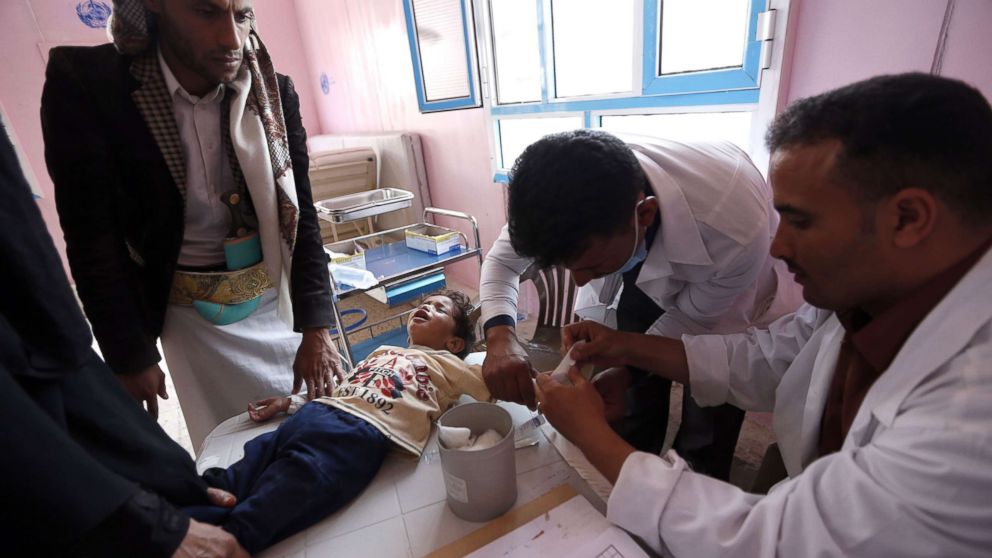Cholera in Yemen: What you need to know
Cholera has infected half a million people in Yemen so far this year.

— -- Cholera has infected half a million people in the Middle Eastern nation of Yemen so far this year, according to a statement released this week by the World Health Organization -- and an estimated 2,000 of those people have already died from it. Health officials say 5,000 people in this country continue to become infected each day.
Below are answers provided by the Centers for Disease Control and Prevention to some of the more common questions about this ancient but nonetheless devastating disease.
What is cholera?
Cholera is an illness caused by the bacterium known as Vibrio cholerae. The infection can range from mild, with no apparent symptoms, to severe illness. Between 5 to 10 percent of those infected will suffer the worst effects of the disease, which include severe diarrhea, vomiting and leg cramps. In the most serious cases, these symptoms can rob a sufferer of his or her body fluids quickly, leading to severe dehydration and shock. In these cases, not seeking immediate treatment can ultimately lead to death.
How does someone get cholera?
The bacteria that leads to cholera is found in food or water that has been contaminated by the feces of an infected person. Because of this, cholera is most common and can spread more quickly in areas where water treatment, sanitation and hygiene practices are inadequate. Epidemics are more likely to happen in these regions because people are at greater risk of consuming food or water from sources that have been contaminated by the feces of an infected person.
This bacteria can also be found in the environment such as in briny rivers and coastal waters.
In addition, a notable but less common cause of cholera infection is consuming raw or undercooked shellfish. There have been a few documented cases of cholera infection after consumption of such preparations of shellfish from the Gulf of Mexico.
The illness is not directly contagious from person to person. This means that you can come into contact with an infected person and not have a higher risk of becoming sick, so long as you do not consume contaminated food and water.
How many people are affected worldwide?
In a given year, researchers estimate that cholera is responsible for 3 to 5 million cases of illness and over 100,000 deaths worldwide.
How long does it take to experience symptoms after you are infected?
After infection, a person can experience symptoms anywhere from within a few hours to five days later. On average, symptoms typically appear in two to three days.
Is it common in the U.S.?
The spread of cholera in the U.S. is very rare today. The real risk is to those Americans who travel to areas where cholera epidemics are common. These areas include regions of Africa, Asia, and South and Central America. Travelers returning from these regions should also be careful about what they bring home since contaminated seafood has been known to cause outbreaks of cholera in the U.S.
How is cholera treated?
Treatment includes immediate replacement of fluid and salts that the body loses in diarrhea. Oral rehydration solution (ORS) is a common form of treatment not only for cholera, but for other diarrheal illnesses worldwide. Typically, it contains a prepackaged mixture of sugar and salts that a person can mix with water. In severe cases of illness, an individual may need fluid replacement given through his or her veins (intravenous or IV fluids). When these simple treatments are employed, less than 1 percent of cholera-infected patients die.
On occasion, doctors will use antibiotic treatment in cholera; however, this step is not considered as important as prompt rehydration.
How can I avoid getting infected?
Sticking to simple precautions while visiting regions where cholera is present keeps the risk for cholera infection very low. A few quick tips:
Is there a vaccine for it?
Yes, but it is not routinely recommended for most travelers from the U.S. However, if a person is traveling to an area known to have active cholera transmission, there is a vaccine option that has been recently approved by the U.S. Food and Drug Administration (FDA). It is called Vaxchora and can be given in one dose by mouth to adults between ages 18 and 64. People considering receiving this vaccine should consult with their primary care provider to ask if it would be appropriate for them.
Although vaccines can offer protection from infectious diseases, prevention measures -- like those noted above -- should be followed as well.
Dr. W. Gina Pang, MD, MPH, is a resident physician specializing in preventive medicine at the University of Michigan.




